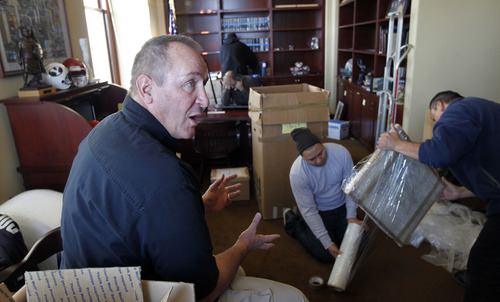This is an archived article that was published on sltrib.com in 2013, and information in the article may be outdated. It is provided only for personal research purposes and may not be reprinted.
Despite former Attorney General Mark Shurtleff's decision to personally sign onto a settlement in a foreclosure lawsuit that Bank of America seemed to be losing, his successor will continue to pursue other suits pending against the bank.
It isn't clear what new Attorney General John Swallow thinks about Shurtleff's reversal of the state's position in a suit brought by Holladay homeowners Timothy and Jennifer Bell that ReconTrust- — BofA's foreclosure arm — illegally began foreclosure proceedings against their property when their $3 million loan went into default.
But Shurtleff's change of mind in the last weeks of his term disheartened lawyers in his office, which previously had intervened in the case as a plaintiff, arguing that ReconTrust had violated state law by carrying out foreclosures on its own instead of going through a Utah attorney or title company.
"Mr. Shurtleff made the decision that he did. Not everyone in the office would agree to that, and people would come to different conclusions about whether or not the state should dismiss the case," assistant attorney general Thom Roberts said after a hearing Tuesday before U.S. District Judge Bruce Jenkins to decide whether the settlement between BofA and the Bells should be approved.
Shurtleff's about-face came some time between Dec. 17, when the Bells agreed to settle without support from the Attorney General's office, and 11 days later when a BofA lawyer filed documents carrying Shurtleff's signature to dismiss the case. Shurtleff's term ended Jan. 7, and he will go to work for a law firm that regularly represents BofA. Shurtleff has said his new job had nothing to do with his decision, adding that he changed his mind because it made no sense for Utah to continue to be involved at taxpayer expense in a case that the Bells had settled.
Lawyers for BofA previously argued that because it is a national bank, it is governed by federal banking regulations that say nationally chartered lenders and their business units are guided by the laws of their home states. ReconTrust is based in Texas.
Jenkins, who previously had ruled in favor of the plaintiffs put off a ruling on the matter Tuesday after pointing out repeatedly that the Bells' lawyer had improperly signed an electronic version of the dismissal document.
The Bells sued BofA in 2011, claiming that another unit of the bank, Countrywide Financial, used predatory lending practices to entice them into a loan to refinance their Holladay home under repayment terms that they couldn't afford. Their suit alleges ReconTrust illegally began foreclosure proceedings when they went into default.
The settlement that BofA and the Bells — and later Shurtleff — agreed to called for the bank to reduce the Bells' original loan of about $3 million by $1.1 million to make the new loan amount equal to the present market value of the property.
The case seems certain to be heard by the 10th Circuit Court of Appeals in Denver. Two other federal judges in Utah have previously sided with ReconTrust in other cases. They agreed that the company was legally foreclosing on properties in the state, even though it was governed by Texas law.
In a ruling last year, Jenkins disagreed. He said rules issued by the Office of the Comproller of the Currency and relied on by ReconTrust were wrong. Federal law was intended to mean that banks had to follow the law of the states where they had initiated foreclosure proceedings, the judge said.
Twitter: @sltribpaul



